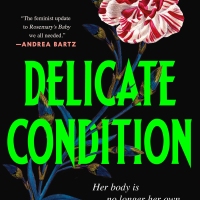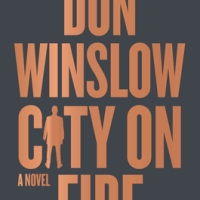Book Review: The Doors of Eden by Adrian Tchaikovsky
I received a review copy from the publisher. This does not affect the contents of my review and all opinions are my own.
 The Doors of Eden by Adrian Tchaikovsky
The Doors of Eden by Adrian Tchaikovsky
Mogsy’s Rating: 3.5 of 5 stars
Genre: Science Fiction
Series: Stand Alone
Publisher: Orbit (August 18, 2020)
Length: 470 pages
Author Information: Website | Twitter
Let me just start by saying that I don’t think Adrian Tchaikovsky is actually capable of writing a bad book, but some are definitely better than others. When it comes to The Doors of Eden, I would probably place it somewhere in the middle as I quite enjoyed it, but I also didn’t think it was his best. Once again, we may have high expectations to blame here.
The Doors of Eden is told through multiple perspectives which are all kind of jumbled and layered on top of each other, because this is a novel involving parallel worlds and alternate timelines. We begin with childhood-friends-turned-lovers Lee and Mal, two young women who’d bonded over a lifelong interest in cryptozoology, heading off into the Bodmin Moor to investigate rumors of a creature known as the Birdman. But something strange happened to them out there in the wilderness, something Lee knows she can’t explain without coming across like she’s completely lost her mind. All that mattered was that at the end of the day, only she emerged from the moorlands while Mal was gone, vanished without a trace.
Next, we meet M15 agent Julian Sabreur, who in his more private moments likes to compare himself to James Bond. He has been placed in charge of providing security and protection for government physicist Kay Amal Khan, a foul-mouthed chain-smoking trans woman who has become the target of a racist hate group. But when the attack comes, it is not Julian’s team who ends up stopping it. While no one actually witnessed the massacre, the attackers appeared to have been ripped apart by someone or something very big and very strong, judging by the grisly bloodbath left behind in Dr. Khan’s living room.
Tasked with finding out what happened, Julian finds himself going down a rabbit hole of conspiracy, mystery, and the unexplained. Meanwhile, it has been four years since Mal’s disappearance, but the grief has not abated for Lee. Incredibly, one day she gets a phone call from Mal, who simply tells her she wants to meet—like she hasn’t been gone this entire time. Even more confounding is when Lee finally does see Mal again, her girlfriend does not appear to be the same person. Everything eventually comes to a head as Julian shows up on Lee’s doorstep, led there by a grainy image taken of a woman who was believed to be dead.
First off, I’m a big fan of sci-fi stories about alternate universes and parallel worlds. I love the endless possibilities they offer, and the mind-warping questions they always seem to leave behind. But on the flip side, these kinds of books often have a lot going on in them, and sometimes, the intricate web of plotlines and character lives can get a tad overwhelming. Tchaikovsky did a great job organizing multiple threads and streamlining the overall narrative, but I think even he stumbled at times and lost control of the story because it occasionally felt like things got away from him. This was especially the case as we delved further into the middle sections of the book, where the storytelling didn’t feel as tightly plotted or well-paced.
Case in point, I knew something was up when I realized I found more pleasure in reading the interludes from the point of view of Professor Ruth Emerson discussing the evolutionary trajectory of various alternate Earths and what they might look like. I mean, granted I’m a biology nerd, but also, the truth is, for most of the book, I just didn’t find the main storyline or any of the main POVs to be all that interesting. In focusing his attention on developing the science and the world-building, it almost felt as if the author neglected to develop his characters with the same amount of care and detail. For a long time, they were mostly defined by their diversity labels, and only later on did the deeper aspects of character-building come in, like personality, interests, and values. Perhaps that was why I never really felt too connected or sympathetic towards the characters.
Still, The Doors of Eden was by no means a bad book—it kept me turning the pages, after all. That said, I thought it could have been better—more entertaining and engaging at least, if the characters had been better developed right off the bat, and if the pacing had been a bit more even. Admittedly, I also expected a lot going into this novel, so that might have played a part in how I ultimately felt too. But is the disappointment going to make me any less excited to read the author’s books after this? Heck no. Like I said, you’re pretty much guaranteed a good read whenever you pick up something by Adrian Tchaikovsky, especially if you enjoy original and clever ideas in SFF. Children of Time remains my go-to recommendation when it comes to his work, but if the sound of The Doors of Eden captures your interest, I would check it out.
![]()
![]()












Great review! I really want to pick up anything from Tchaikovsky, his work sounds like something I would like!
(www.evelynreads.com)
LikeLike
I would try Children of Time, if you’ve never tried his work – it’s brilliant 🙂
LikeLiked by 1 person
I‘m with your opinion that his Children of Time is far better and more engaging. But I‘ve seemed to like this novel a notch better, and don’t have any complaints with the pacing. The infodumping interludes were always a highlight, and they felt on par with his older novel – if only the rest would have been as good. But that‘s complaining about first world problems.
LikeLike
Seriously those interlude parts were my favorite, lol! I know it was a lot of infodumping but it’s a pet topic for me, so I ate it all up. I just wished the characters had been as interesting! But I will still always want to read Tchaikovsky, I love his ideas.
LikeLiked by 1 person
I haven’t read any of his fantasy novels. Alas, my sorry tbr 😁
LikeLike
I think I’ve read only one – Redemption’s Blade. And I believe it was part of a greater project he was on with others so I don’t really count it. I’ve had Empire in Black and Gold on my TBR FOREVER though 😛
LikeLike
There’s just a Netgalley anthology up with redemption blade short stories. I‘m not tempted, as I haven’t read the novel, but it might be a thing for you?
LikeLike
While I enjoyed this novel more than you did, I can sympathize with your feelings that at times the author did lose control of his story and that there was too much on the table than he could easily handle: the middle of the book did leave me a little lost and confused, and it was only the high-adrenaline final sequences than changed my mind in the end. Still, I’m glad you managed to enjoy the story even though your expectations might have weighed heavily on the end result…
Thanks for sharing! 🙂
LikeLike
Yes, I experienced the same. I think it all made sense in his mind but wasn’t able to convey it as well on paper. But I don’t blame him, it’s a complicated topic and story!
LikeLike
I have a copy of this and started reading but was struggling a little bit so put it down for now. I will give it another go but want to be in the right mood.
Lynn 😀
LikeLike
If you can push through the interludes and the heavy science bits, it does get better!
LikeLike
Having not read Children of Time yet, I have a feeling I’ll enjoy this more than you😁
LikeLike
I think you might! Good luck with it! 😀
LikeLike
I have heard Tchaikovsky is a great author. Sorry to know, this book didn’t live up to your expectations. Thanks for sharing!
LikeLike
He’s definitely a great writer and talented storyteller! Like I said, just some of his books are better than others 😉
LikeLiked by 1 person
I just found this book a sheer joy to read – yeah, I had to let it go its merry way a few times, but it was the right tonic for me in depressing times. Your review is much more balanced than mine. Thank you!
LikeLike
Thank you for your comment! I agree, this book was certainly entertaining! And you definitely had to go with the flow sometimes 🙂
LikeLike
Even if it could have been more, it’s nice to have something different
LikeLike
For sure. I love different 🙂
LikeLike
I can’t remember if I ever tried him, hmmm
LikeLike
You might have! He’s written quite a lot 🙂
LikeLike
Well, I’d hoped you’d like this one more, but it’s also good to know you did still enjoy it. I’ve not read nearly enough by Tchaikovsky, mostly his shorter works. But I do have Children of Time so it sounds like I need to make some time to try it.
LikeLike
Ooh, I would highly recommend doing Children of Time first! 😀
LikeLike
I still haven’t read this author yet *sigh* but I’ve heard good things so it’s probably only a matter of time. I will definitely start with the one you mentioned though as a better stating point. Nice that even if not a favorite that the author still tells a compelling story. 🙂
LikeLike
I understand, there are so many authors on my own TBR I have yet to get to because of lack of time! But yes, if you’re looking for a good starting point, I would highly recommend Children of Time!
LikeLike
Thanks, will go into this with slightly dampened expectations!
LikeLike
Hope you’ll still enjoy it!
LikeLiked by 1 person
Pingback: Bookshelf Roundup 10/17/20: Stacking the Shelves & Recent Reads | The BiblioSanctum
Ah, sometimes ones expectations can play a factor. Still, glad that you mostly enjoyed this one even if it wasn’t a favorite. 😀
LikeLike
For sure, expectations DEFINITELY played a part here! Maybe a small role, but it still mattered 🙂
LikeLiked by 1 person
Pingback: The Doors of Eden by Adrian Tchaikovsky (2020) – Prehistoric Pulp